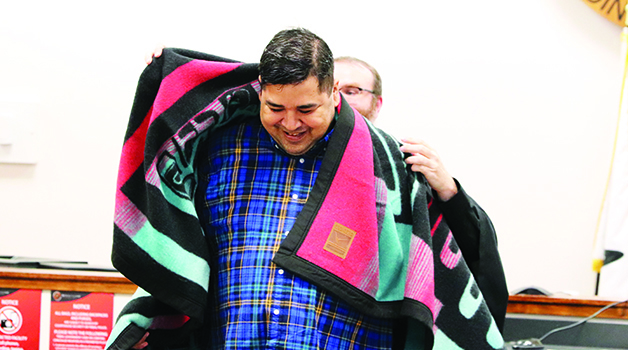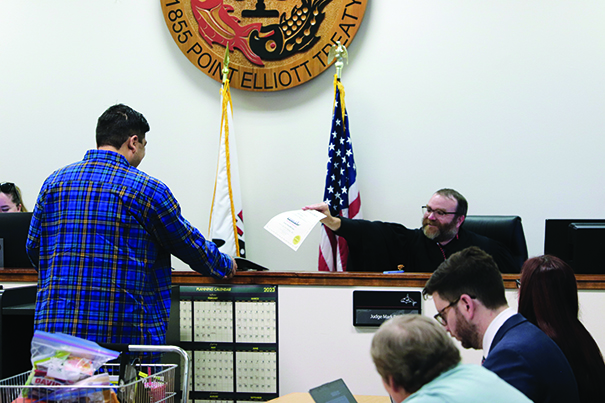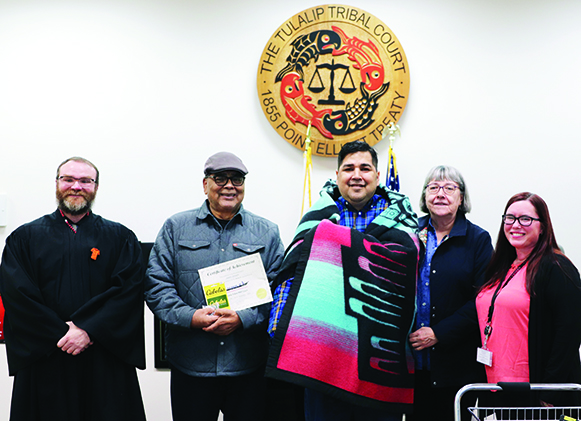
By Kalvin Valdillez, Tulalip News
November 9 was a historic day for Tulalip’s court system. We will have more on this big news in a few paragraphs, but first we want to introduce you to the court’s new alternative program that was implemented in October of 2022, which aims to assist tribal members involved with the courts and are in need of mental health care.
The Mental Health Alternatives Program (MAP) is designed to reduce recidivism in misdemeanor cases by providing those who qualify with a detailed 12-month plan that includes mental health treatment, community give back hours, as well as frequent court appearances, peer support group participation and phone check-ins.
According to the program’s literature, “MAP is a problem-solving approach to pending non-felony criminal cases, designed to hold offenders accountable and address underlying issues. The participants are connected to services that already exist in our community with the ultimate goal of keeping them from future criminal conduct. Participants have the opportunity to obtain services to address particular issues that may have contributed to criminal conduct, assisting them to achieve long term stability, become law-abiding citizens, and become successful family/community members.”
The program is a joint partnership between three parties, the tribal court system of course, and also Tulalip Family Services which is where the participants go for both their mental health assessments and treatment throughout the duration of the program. The third party is a local manufacturing company called Bridgeways, a social enterprise that is dedicated to assisting people living with mental illnesses whether it’s in regard to gaining or maintaining employment, housing support, or through their therapeutic courts program.

Bridgeways previously established two MAP programs at the Marysville and Everett municipal courts. And when the Tulalip court reached out to them about bringing a mental health focused program to the reservation, they were happy to lend their expertise. Now, with a trifecta of MAPs located in the heart of the Snohomish County region, Bridgeways is actively addressing an issue that may be the root of many reoffenders’ criminal behavior.
Moreover, they are doing this work in a highly effective manner that is concurrent to their mission statement of ‘providing services that promote quality of life for individuals living with a mental health concern in a manner that facilitates growth, independence, and a sense of community.’ In fact, according to the Bridgeways website, and with data collected by their judges, 93% of their graduates have experienced a reduction of recidivism.
Cathy Wheatcroft, Bridgeways Therapeutic Courts Program Manager, spoke about their partnership with the tribe, “Over a year and a half ago, Brian Kilgore, one of the prosecutors here, reached out to Bridgeways because we have Mental Health Alternatives Program courts in Marysville in Everett. And we’ve been doing MAP in those two courts – in Everett since 2014, and in Marysville since 2018.
“A few similarities – they all have three phases and are designed to be about a year long. It’s always the same core team, not from court to court, but it is always the same defense attorney, same prosecutor, same judge. And our liaison Jessica Barker also [works closely with participants] so they know the participants pretty well, it’s not like new people always coming in and out. And all three have the peer support group that they are required to participate in. Some differences are Tulalip holds court weekly and Everett and Marysville hold court every other week. Tulalip also does random UAs, which I feel holds the participants more accountable. But we all do this to help people and to see all their successes, they’re doing the work and I get to witness it and I think that’s amazing.”
Bridgeways’ successful program served as the framework to Tulalip’s MAP program. Drawing inspiration from the Tulalip Healing to Wellness and Family Wellness Court programs, MAP also has a certain requirement of giveback hours where the participants must volunteer some of their time to working local events and gatherings. Community giveback hours has helped numerous people get reacclimated into the tribal community and reacquainted with the people over the years.
With the MAP team supporting them along their 12-month journey, the participants set and define their life goals and immediately start working toward achieving them while in the program. Split into three, 4-month phases, the participants begin phase one with weekly court hearings, in phase two they attended bi-weekly court sessions, and in the final phase they meet with the judge on a monthly basis. If the participants follow their personalized plans that they put together with the MAP team, and remain in compliance each visit to the courthouse, they get to pick an item from a large basket of incentives to bring home. However, if they fall out of compliance, there are some sanctions that could range from an essay assigned by the judge to the termination from the program altogether.
“MAP is specifically designed to help people who have special mental health needs,” explained Judge Joshua Heath. “As a part of the program, they have to take their meds, if they’re supposed to be taking medication. They have to go to their mental health appointments. If they’ve got a cooccurring substance abuse disorder, we’ll help with that also. The Mental Health Alternatives Program is less punitive, probably the least punitive out of our programs because we’re just trying to understand where people are coming from. And we want them to be able to live a lifestyle that’s crime-free. Ultimately, that’s the goal of the Mental Health Alternatives Program is to live a crime free lifestyle. We want to give them whatever the help it is that they need, whether it’s getting a job or finding certain kinds of skills, even life skills, how to do basic things around the house – laundry and cooking, and so on. We want people to be able to graduate from a program and be able to be successful.”
Now that you have an understanding about the MAP court program, we can get back to the headlining news. But first, we’d be remiss to mention that this is the only tribal court Mental Health Alternatives Program to ever exist, so far at least, throughout all of Native America. Alright, so with that being said, it’s time for the big news: this November, Tulalip tribal member Jason Joseph became the very first graduate of a tribal MAP court program in all of history!
After confirming that he remained compliant through the last leg of the program, Judge Heath handed Jason a certificate of completion before he wrapped him in an Eighth Generation blanket and embraced him in a hug. Jason wore a smile as he was cheered on by a packed courthouse. Tears filled his eyes as his parent’s beamed with pride and his mom graciously thanked the MAP team for assisting in her son’s life transformation.

This was a momentous occasion for Jason, his family, the Tulalip MAP court program and its entire team, as it opens up a much-needed discussion about mental health within tribal nations. It also provides a new approach to addressing those mental health issues that many of our people are suffering from and have inherited from previous generations of trauma. Jason is the proof that cycles can be broken and that with the proper guidance and assistance, people living with a mental illness can turn their lives around and get set back on track in their own personal journey.
Several tribal members opted into the program prior to Jason’s ceremony, and a handful of individuals who were already in the program shared their progress. Jason’s accomplishment was equally important for them to witness because they were able to see that the program does indeed work, and hopefully they were able to envision themselves in Jason’s moccs, receiving a certificate of their own in about a year or so.
Jason shared, “It feels like it was a long time coming. It was like a yearlong process, but it was worthwhile. I learned a lot about myself and about people with mental health issues – what we need to do to get through the day, to get through life. This is important because tribal members with mental health issues have their own place to go to court now, and they can be represented openly and clearly in the right way.”
For additional details about the program, please contact the Tulalip tribal court system or MAP court liaison Jessica Barker. The following information was provided by the Tulalip Mental Health Alternatives Program:
Mental Health Alternatives Program
Requirements:
- Only misdemeanor charges can be referred to MAP. Charges not eligible: DUI, sexual offense, serious violent offense, offense which defendant used a firearm
- Participant must be amenable to mental health and/or chemical dependency treatment as appropriate
- Participant must not have been deemed incompetent to assist in their own defense and must not pose a risk to the MAP team
- Willing to sign agreement to follow program requirements
How to Refer:
Contact: MAP court liaison Jessica Barker
- Email: j.barker@tulaliptribes-nsn.gov or j.barker@bridgeways.org
- Phone: 360-716-4718
- Cell: 425-499-8051
Contact: Wellness Court Manager
- Email: Wellnesscourt@tulaliptribes-nsn.gov
- Phone: 360-716-4764